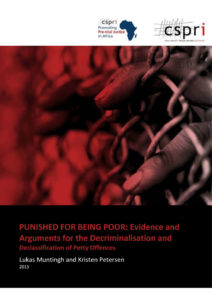Evidence and Arguments for the Decriminalisation and Declassification of Petty Offences
The Ouagadougou Declaration and Plan of Action on Accelerating Prison and Penal Reform in Africa of 20031 endorsed recommendations calling for reducing the size of prison populations in Africa. The Plan of Action recommended the ‘decriminalisation of some offences such as being a rogue and vagabond, loitering, prostitution, failure to pay debts and disobedience to parents’ as a strategy to reduce the prison population. More than a decade has passed and few countries have made any progress in implementing this strategy endorsed by the African Commission on Human and Peoples’ Rights (ACHPR). Many of the offences identified by the ACHPR as ripe for repeal amount to nothing more than the criminalisation of poverty, homelessness, and unemployment. Certain offences, such as loitering and being a ‘rogue’ and ‘vagabond’, date back to colonial times and have no place in Africa anymore. They must be repealed. Their continued enforcement is disproportionately experienced by the poor and marginalised populations, including persons with disabilities. The existence of these laws, and their enforcement, are justified by proponents with unsubstantiated arguments based more on anecdote and bias than fact. Such proponents argue, for example, that arresting people for loitering prevents crime and has a deterrent effect on would-be criminals. It is similarly argued that arresting street children and persons with intellectual and psychosocial disabilities in so-called sweeping operations encourages them to return to their homes and families and relieves the public of the burden and inconvenience of such persons. There is no evidence to support these claims.

